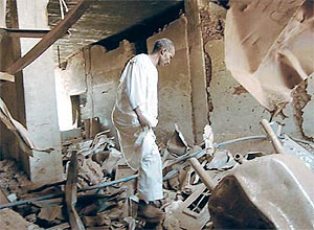U.S. judges throw out an appeal by owner of Sudanese pharmaceutical plant
June 8, 2010 (WASHINGTON) — A federal appeals court on Tuesday dismissed an appeal by the owner of a Sudanese pharmaceutical factory destroyed by U.S. missile strike in 1998 ordered by then president Bill Clinton.

Salah Idris who was the owner of the doomed factory had sought $50 million in compensation from the U.S. government for the demolition of his factory that resulted from the strike. The U.S. Court of Federal Claims dismissed the case in 2003 saying that the “enemy target of military force” has no right to compensation for “the destruction of property designated by the President as enemy war-making property.”
The ruling today was in response to the attorneys for the plaintiff challenging the dismissal of their claims alleging a violation of the law of nations and defamation. The U.S. District Court for the District of Columbia documents say that Idris have abandoned any request for monetary relief, but still seek a declaration that the government’s failure to compensate them for the destruction of the plant violated customary international law, a declaration that statements government officials made about them were defamatory, and an injunction requiring the government to retract those statements”.
The same court has made a majority decision on the matter over a year ago and held that “courts are not a forum for second-guessing the merits of foreign policy and national security decisions textually committed to the political branches,”. In August the full court agreed to hear an appeal from Idris’s lawyers and an oral presentation was made last December on the issue of analyzing cases involving foreign policy decisions.
But the judges unanimously dismissed the case reaffirming that the case involved a political question covered by a legal doctrine that means the suit cannot be reviewed by the judicial branch.
“If the political question doctrine means anything in the arena of national security and foreign relations, it means the courts cannot assess the merits of the president’s decision to launch an attack on a foreign target,” Judge Thomas Griffith wrote in the opinion.
“Under the political question doctrine, the foreign target of a military strike cannot challenge in court the wisdom of retaliatory military action taken by the United States,” he concluded.
Judge Brett Kavanaugh wrote a separate opinion agreeing with the majority in dismissing the lawsuit but on different legal grounds.
He said the suit could have been dismissed because it was completely without merit and that the court did not need to address the political question doctrine.
The plant’s owners denied it was a chemical weapons facility or in any way connected to bin Laden or his network. They said the destroyed plant had been Sudan’s largest manufacturer of medicinal products.
The Sudanese government have said that the U.S. military actions led to thousands of deaths to people who were denied access to medicine produced by the factory.
“All of the justifications for the attack advanced by the United States were based on false factual premises and were offered with reckless disregard of the truth based upon grossly incomplete research and unreasonable analysis of inconclusive intelligence” Idris lawyers said.
An official at the Sudan Rabie Abdulatti Obeid ruling National Congress Party (NCP) told Voice of America (VOA) that his country wants a formal apology from the U.S. apologize and pay compensation to both the owners of the plant as well as the government.
“The people of Sudan are still very angry from that action and this will not be forgotten by this generation or the coming generation because it will be recorded in the register of history for Sudan people and for the people of the whole African continent and the Arab world,” Obeid said.
(ST)

Mr.Atok
U.S. judges throw out an appeal by owner of Sudanese pharmaceutical plant
NCP government has no justifable claims to be compensated as the factory was indeed a chemical hub meant to kill masses in Southern Sudan and other areas within their target.
The factory was sponsored by Alqaeda network and its activities are outlawed.
Second to that NCP government had been bombing cattle camps in the South in the name of fluashing out SPLA yet there was no research done unlike the case of the factory where US intelligent took soil sample around the premises proving it as deadliest to security both within Sudan and outside world.
Ask heavenly father for that bloodliest compensation.
Atok
paul baak anyaar
U.S. judges throw out an appeal by owner of Sudanese pharmaceutical plant
Wow! These judges are of my kind. This claim for compensation is pretty unreasonable. The factory, I believe, produced deadly chemicals used by Al Qaeda mercenaries in killing innocent people in Iraq, Afganstan and around the world. The factory owner should pay reparations for those innocent lives before further claims. In 1998, Bin Laden was believed to have been hosted in Khartoum by his uncle Al Bashir and this sounds right. Besides, if Al Qaeda based themselves in Khartoum when they bombed the U.S embassies in both Arusha and Nairobi, then the Government of Khartoum is guilty of a serious crime. And these are the circumstances that led to the demolition of the so-called medicinal factory. Therefore, if at all compensation be made to the supposedly murderous claimant, then it is unequivocally upon the Government of Khartoum to do it.
Kur
U.S. judges throw out an appeal by owner of Sudanese pharmaceutical plant
It was bin Laden’s factory. The US was therefore justified in destroying it. It would not make sense to compensate terrorists who have destroyed millions of lives.
They seek justice that they do not deserve but they never give justice to innocent people they kill and rape each day.
Kur